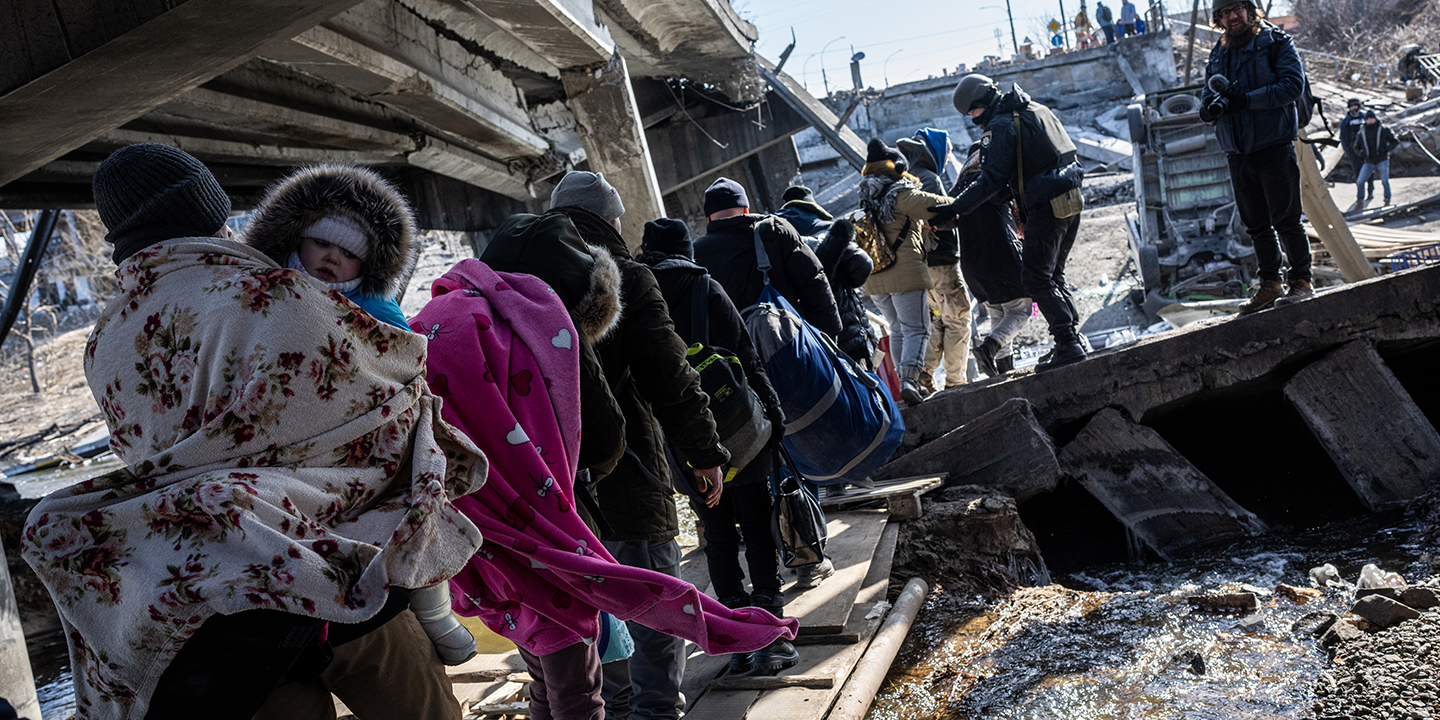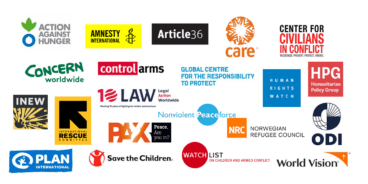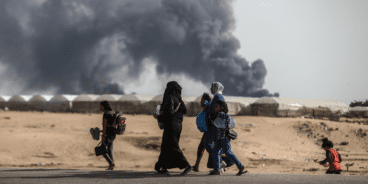

Civil Society Statement on the Protection of Civilians in Urban Conflict (2022)
On May 25th, 2022, the UN Security Council will hold its annual open debate on the protection of civilians (POC) in armed conflict. The debate is an important opportunity for UN Member States to reflect on the current state of POC and on actions to ameliorate the devastating toll of today’s conflicts on civilians.
Previous joint civil society statements have advanced a broad range of robust and progressive recommendations to this end. With civilians accounting for up to 87% of the casualties during war, we call on the UN Security Council, Member States, and other entities within the UN system to implement these recommendations to achieve better protection outcomes, especially by strengthening compliance with international humanitarian and human rights law, ending impunity, preventing and addressing conflict-related sexual violence, ending and preventing grave violations committed against children, engaging civil society, and consolidating the role of protection at the heart of UN peace operations.
The events of the past year have again highlighted the disastrous impact of urban warfare on civilians. Today, 55% of the world’s population resides in urban areas. Harm to civilians resulting from armed conflict in towns and cities is not a new phenomenon. From Baghdad to Mogadishu, Marawi to Raqqa, and Marib to Mariupol, it is abundantly clear that civilians living in cities are at a heightened risk of harm during and after conflict.
Urban warfare causes reverberating civilian harm that goes beyond direct death and injury and outlasts the duration of hostilities. The consequences are complex and wide-ranging, direct and indirect, immediate and long-term, visible and invisible. Urban conflict damages the critical infrastructure that civilian populations rely on, disrupting the provision of essential services and exacting devastating costs on civilians’ health, safety, and well-being. Vulnerable populations are disproportionately affected by urban warfare. For example, persons with disabilities are exposed to numerous risks and barriers, including lack of accessible evacuation options or being deliberately targeted. Women and girls risk being exposed to higher levels and different forms of gender based violence and abuse.
Children are especially impacted by attacks on schools, destruction of medical facilities, and disruption to markets and food supplies. Interruption of education, health, and nutrition services, even for short periods of time, can reverse years of development and impair a country’s ability to rebuild.
Civilian harm resulting from conflict is exacerbated by the use of explosive weapons with wide area effects, designed for warfare in open areas but now all too frequently used in urban settings. The use of explosive weapons in populated areas (EWIPA) not only leads to significant physical harm to civilians – 90% of victims are civilians – but also destroys water and sanitation infrastructure, power supplies, food sources and supply routes, hospitals and other medical facilities, and schools. In addition, explosive weapons have an inordinate impact on the environment in towns and cities and on which people depend, particularly from large amounts of debris, rubble, and post-conflict unsustainable reconstruction practices affecting rivers and groundwater.
Life-saving services and assistance in the context of urban conflicts, including food, water, and medicines, are further imperiled when parties to a conflict use siege tactics – at times for protracted periods. Regardless of how armed actors undertake their operations, international humanitarian law (IHL) obligates parties to a conflict to allow and facilitate access for humanitarian actors to affected areas and civilians in need. Attacks on humanitarian personnel, unreasonable bureaucratic impediments, and counterterrorism provisions also unduly hinder the provision of principled humanitarian assistance in urban warfare settings.
Finally, fighting in urban centers inevitably results in mass and protracted displacement. Displaced people often face significant barriers to inclusion in the societies, economies, and political systems in the communities that host them. Even when fighting is over, the destruction of homes and infrastructure and the resulting lack of essential services, as well as ongoing instability and the presence of toxic and explosive remnants of war, prevent many displaced people from returning to their homes. Rebuilding and restoring services and clearing explosive ordnance are immediate prerequisites for the safe return of displaced persons and long-term recovery in conflict settings.
The serious humanitarian consequences of urban warfare make preventive action, efforts to address the needs of affected communities, and ensuring accountability for violations some of the most pressing issues on the POC agenda today. In addition to the legal obligations incumbent on parties to conflict, the responsibility for preventing and mitigating harm, and for ensuring accountability and redress, is shared across the international community. We call on Member States to take responsibility for the protection of civilians in the context of urban warfare by taking concrete actions at three levels:
First, at a national level, Member States should strengthen their commitment to POC in the context of urban warfare, including by ensuring their own armed forces – and those of their security partners and allies – are trained to prevent, minimize, and address civilian harm that could or does occur from operations in urban areas. This must include designing and implementing national POC policies as well as relevant on-the-ground operational procedures and practices to mitigate civilian harm, ensuring investigation and accountability for violations and providing amends for victims. In so doing, States should actively and meaningfully consult with a range of civil society.
Member States should also acknowledge and respond to the harm to civilians, including as a result from damage to civilian infrastructure, caused by the use of explosive weapons in populated areas. In developing the EWIPA Political Declaration, States should support a strong commitment to avoid the use of explosive weapons with wide area effects in populated areas, then endorse and implement the declaration when it is open for endorsement. Member States should endorse and implement the Safe Schools Declaration as a tool for fully protecting civilians from the impacts of attacks on education, including attacks that involve explosive weapons. Consideration of humanitarian consequences must also be at the center of all arms transfer decisions.
Second, Member States should work together to implement the POC agenda wherever possible and request more rigorous UN reporting on the risks, trends, and impacts of urban warfare on civilians. States should help bolster the UN’s resources and capacity to respond to protection challenges in urban areas and should better integrate ongoing work on the specialized protection mandates and the work done by agencies, funds, and programmes. Member States on the UN Security Council should consistently prioritize the protection of civilians in the context of urban warfare, including in peace operation mandates and when making decisions about sanctions regimes. The Council should also quickly and unequivocally condemn violations of IHL that result in harm to civilians and civilian infrastructure, and ensure accountability, as well as use its influence to engage with conflict parties to prevent, reduce, mitigate, and respond to civilian harm. Permanent members should commit to suspending the use of the veto to block measures aimed at preventing, ending, and remedying atrocity crimes.
Third, Member States engaged in protection of civilians should recognize that diverse local civil society actors are indispensable to POC. All actors in or responding to urban conflict should make use of and build on the local expertise of affected communities and civil society organizations and support their unarmed self-protection efforts, while ensuring the meaningful engagement of women, youth, and members of marginalized communities. Through their diplomatic, military, and development partnerships, Member States should help identify and support, including through financial resources, pre-existing practices and mechanisms that communities use to protect themselves.
Armed actors should proactively reach out to civilians and include their perspectives, to the extent feasible, and integrate inclusive consultations with communities into operational planning throughout the conduct of hostilities. Finally, civil society plays a crucial role in promoting accountability for civilian harm by documenting incidents or patterns of harm and recording information about the injured, dead, and missing. Member States should work with civil society to ensure these efforts are translated into meaningful accountability for harm to civilians.
Endorsing Organizations:
- Action Against Hunger
- Action on Armed Violence
- Amnesty International
- Article 36
- CARE International
- Center for Civilians in Conflict
- Concern Worldwide
- Control Arms
- Global Centre for the Responsibility to Protect
- Global Coalition to Protect Education from Attack
- Human Rights Watch
- Humanity & Inclusion – Handicap International (HI)
- International Network on Explosive Weapons
- International Rescue Committee
- Nonviolent Peaceforce
- Norwegian Refugee Council
- Oxfam
- PAX
- Plan International
- Save the Children
- Watchlist on Children and Armed Conflict
- Women’s Refugee Commission
- World Vision International
See also: 2019 Joint NGO Statement; 2020 Joint NGO Statement; 2021 Joint NGO Statement
Related Content


